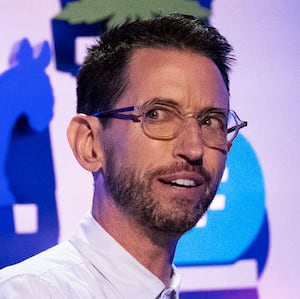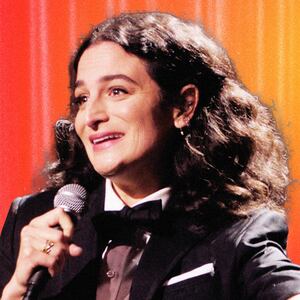Before Donnell Rawlings was a professional comedian, he was an amateur heckler. He would go to comedy clubs and yell back at the stage, sometimes getting even bigger laughs than the guy with the mic. So even with his Dave Chappelle-produced stand-up special A New Day dropping on Netflix this week, it’s perhaps no surprise that he recently came full circle, getting caught on camera heckling a fellow comic for going after both him and his famous friend of more than 20 years.
In this episode of The Last Laugh podcast, Rawlings breaks down that viral incident and talks about the long and “humbling” road he took to finally get his own Netflix moment. He also reflects on making a huge mark on Chappelle’s Show with relatively little screen time, how he felt about Chappelle walking away from that show without telling him, and why he has no time for anyone who might be offended by their comedy.
“My life is always on the road,” Rawlings says from his L.A. hotel room a few days before his special dropped on Netflix. But these days, home is in Yellow Springs, Ohio. When I ask if he moved there to be closer to that town’s most famous resident—Chappelle—Rawlings replies, “No, I moved to be closer to nature. After the pandemic, I told myself, ‘Hollywood is dead, I’m good.’”
That sentiment was confirmed for Rawlings when he found himself at the center of a new comedy feud at the Laugh Factory last week after comedian Corey Holcomb came after both him and Chappelle from the stage. Rawlings ended up screaming back at Holcomb from the audience, partially to defend Chappelle, but mostly to push back on the suggestion that his own comedy was in any way “mild.”
“To try to paint the picture of me not being funny, that’s when I just snapped,” Rawlings explains a few days later. “Because after 30 years, you could say I’m ashy, you could say I’m ugly, you could say a lot of things. But the thing that I hold close to my chest is that I know I’m funny.”
As for Chappelle, he adds, “I don’t have to come to his defense, but I do defend him.” Rawlings says their relationship extends far beyond Chappelle’s Show and comedy. “We are best friends,” he says. “It’s not just that we work together, we’ve been to funerals together, we’ve been to cookouts together. So if you talk sideways, I can’t listen to it. Take that shit to somebody else, but not to me, because he’s like a brother. If you say something to my family member, then I’m gonna check you.”
That unwavering support extends to defending Chappelle against the backlash that has followed him in recent years—even as he is arguably more popular and powerful than ever. “If people say, Dave got in trouble, you might have three people that didn’t like it and 97 people that loved it,” Rawlings says. “But the focus is on those three people as opposed to the 97. And I think people like Dave, people like myself, people like Chris Rock, we’re taking back who we appreciate and we’re showing them love. And that 3 percent can go kick rocks.”
But does Rawlings understand why people were specifically upset about Chappelle’s jokes targeting the trans community? “You want my honest opinion? No,” he says defiantly, citing Chappelle’s material about his trans friend Daphne Dorman, who committed suicide, as an example of something only an “overly sensitive person” could be offended by.
“Dave’s point on everything is like, I understand you, I hear you, but that doesn’t mean I have to agree with everything that you’re saying,” Rawlings says. “People want to find something to be mad at. There are some people who aren’t happy unless they’re mad. And the reason why I take offense to that is because you are trying to destroy my friend’s character. And I know how hard he tries to be fair.”
Now, nearly 20 years after Chappelle walked away from Chappelle’s Show without saying a word to Rawlings, he is serving as producer of A New Day, which is the latest installment in the “Chappelle’s Home Team” series of specials on Netflix.
“I never asked Dave, ‘Hey, do you want to produce my special?’” Rawlings says, explaining that Chappelle brought the idea to him after watching him kill night after night during the “Summer Camp” stand-up shows in Yellow Springs starting in 2020. Almost four years have elapsed between that original conversation and the special’s premiere this week. And during that time, Rawlings taped two versions that Chappelle decided weren’t good enough to put on the platform.
The first time Chappelle told him he wanted to re-shoot the special, Rawlings said it was “the most insulting thing you could say to a comedian who thinks he just destroyed the room.” He remembers Chappelle telling him, “Donnell, you’re one of the funniest guys I know. I could put you in front of any room and you’ll destroy the room. But that does not make it a great special.” After his second attempt to get it in the can, Chappelle said he didn’t like the production value. “I’m like, you’re the producer!” Rawlings recalls telling him, incredulously.
The special that finally started streaming on Netflix this Tuesday was filmed last November, and Rawlings feels like it was worth the wait. “When I look back at it, I tell him, thank you,” he says. “Thank you for being not just a friend, but being honest. It only made me stronger.”
Below are more highlights from our conversation. You can listen to the whole thing by following The Last Laugh on Apple Podcasts, Spotify, Google, or wherever you get your podcasts, and be the first to hear new episodes when they are released every Wednesday.
The state of his career when ‘Chappelle’s Show’ came along
“That show was so big that people act like I wasn’t doing anything before that. I was a comic. I came from the Black circuit, BET, Def Jam era. But in some kind of way I got into acting. Before Chappelle’s Show, I had already done three episodes of Law & Order. I had already done HBO’s The Corner, which led to The Wire. I had done so much dramatic acting that people didn’t even know I was a comedian. The first comedic thing I ever did on television was Chappelle’s Show. I was on the come-up. From my class of comedy, there was nobody doing what I was doing. And everybody’s like, “If it wasn’t for Dave, blah blah blah…” The bottom line is Dave Chappelle and Neal Brennan gave me a platform for people to see what I was already doing and what I was destined to do.”
Why his role on ‘The Wire’ wasn’t a bigger part of the show
“What a lot of people don’t know is when I went to the set for The Wire [to play Damien “Day-Day” Price], the executive producer Robert Colesberry—he passed away some years ago—he said, we had you to play Omar, but we wanted to save you for this role of Senator Clay Davis’ assistant. It was a small role that was going to be bigger. But what happened was, the Baltimore Tourism board was so upset with the way that production treated Baltimore, like it’s always about drugs and everything. That’s why after that first season it went from the towers to the docks; they had to switch the whole storyline. And when they switched the storyline, that’s when my character got lost in the arc and it was over. But I knew that character was going to be dope, because that character had his hands in the streets and in politics. I was so ready. I was like, this is going to be it. But they switched it.”
How he found out Chappelle was walking away from Comedy Central—and $50 million
“I found out like everybody else, through the news. The behind-the-scenes stuff, Dave and Neal kept it away from us. We weren’t focused on that, we were just so happy. Charlie Murphy went from ‘Eddie’s Murphy’s brother’ to Charlie Murphy. I went from Ashy Larry to ‘I’m rich, biatch!’ When we were going back into production for the show, me and Charlie were a little upset because that meant we had to come off the road for three months and we weren’t going to make that much money. I didn’t really make too much money on the show. And I’m not saying that to bitch or anything. I’ve never bitched about the money I was making on the show, because I knew the money I was making was nothing compared to the money I was going to make from doing the show. I would have done this show for free.”
Why he regrets co-hosting the ‘Lost Episodes’ of ‘Chappelle’s Show’
“When we did Chappelle’s Show the ‘Lost Episodes,’ we hadn’t talked to Dave or anything. And Comedy Central had an archive of video they wanted to do something with. I didn’t know what Dave’s frame of mind was or anything. And me and Charlie [Murphy] were looking at it like, this might be our last opportunity to do this. Not knowing the politics involved with it, not knowing what Dave’s feelings about it were, we decided to do it as closure. Not trying to get a career, not saying we’re gonna be the new Chappelle’s Show. It was almost like a funeral for the show. But then, as time passed, Dave told me that he felt uncomfortable about that. So I do regret that. And I said, Dave, if you would have picked up the phone and let us know where you were—all you would have had to do is say, ‘I’m not fucking with [Comedy Central], don’t fuck with them.’ But he didn’t say anything.”
Listen to the episode now and follow The Last Laugh on Apple Podcasts, Spotify, Google, or wherever you get your podcasts to be the first to hear new episodes when they are released every Wednesday.








